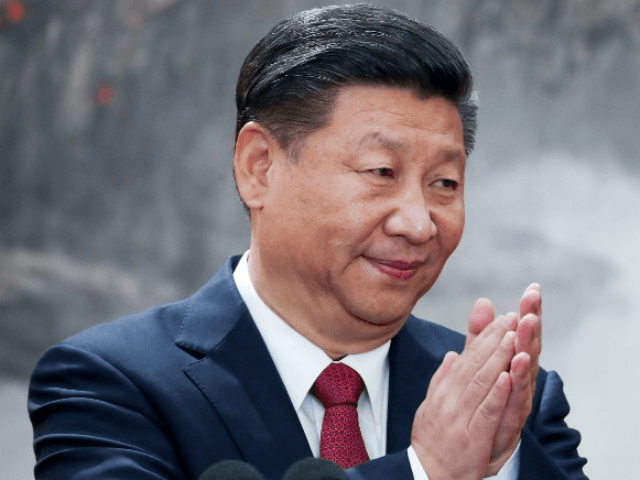Chinese Communist Party leader Xi Jinping has used “a blend of soft and hard power to boost China’s international image,” Time magazine noted Wednesday in its list of the 100 most influential people in the world.
Author Jon Huntsman, former ambassador to China before Xi assumed power and former Republican presidential candidate, accuses Xi of attempting to consolidate “imperial one-man rule” and writes that his “authoritarianism being showcased to the world serves as an alternative to the Western model.”
His piece only offers details on his expansive Belt and Road economic initiative rather than specifically addressing Xi’s use of modern-day “concentration camps” against Muslims, harvesting of organs from thousands of political prisoners, and his imposition of a “social credit system” tracking every move on the general population.
“China’s movement toward center stage has run in parallel with Xi’s personal brand—a modern Son of Heaven recapturing China’s pre-eminence. He has made himself indispensable,” Huntsman writes, stating that Xi’s philosophy has returned China’s ruling regime to “Confucian values – benevolence, virtue, and filial piety.”
Huntsman cites the ambition of Xi’s Belt and Road Initiative (BRI), a plan to ensure China dominance of the world’s most important ports, roads, and railways. It is, he writes, “the first time China has ‘gone global.'”
“Contradictions are many in the world’s second largest economy, where civil society is nonexistent,” the piece concludes. “Xi’s authoritarianism being showcased to the world serves as an alternative to the Western model. His legacy is tied to whether it will be accepted.”
The Time feature acknowledges the existence of severe human rights problems under Xi’s rule without addressing them. Communist China has never had a clean record on the matter – Mao Zedong is believed to have killed at least 45 million people in four years under the Great Leap Forward – but the state of affairs under Xi has deteriorated to levels not seen since before the tenure of reformer Deng Xiaoping. That China, as Huntsman notes, wishes to export its repressive model makes discussing it all the more necessary.
Perhaps the most egregious human rights violations currently known to occur in China targets its ethnic minorities in western Xinjiang province, the largest of the nation’s territories and the furthest away from Beijing. The U.S. State Department revealed in 2018 that Xi’s regime had constructed internment camps to “re-educate” Muslims of Uighur, Kazakh, Kyrgyz, and other minority backgrounds. Survivors of the camps said Communist Party agents forced them to learn Mandarin, eat pork as a gesture of abandoning Islam, memorize songs praising Xi Jinping, and pledge loyalty to the Party.
China responded to the reports by calling the camps “vocational centers” and claiming that their goal is to “re-educate” ethnic minorities to make them more viable in the modern Chinese workforce. When reports in Western media revealed that China was also using its prisoners as slaves to make clothing – some of which found its way into the United States – officials insisted that they were “boarding schools” necessary to deprogram radical Islamic terrorism and integrate minorities in a Han majority nation.
Outside of Xinjiang, former Chinese political prisoners have for years accused the Communist Party of using their bodies to harvest organs without consent, some after their deaths. A 2016 study appeared to prove that Xi Jinping’s regime was indeed committing this human rights atrocity, particularly among practitioners of Falun Gong. The study – by former Canadian lawmaker David Kilgour, human rights lawyer David Matas, and journalist Ethan Gutmann – found the Chinese government could not account for the origin of between 50,000 and 90,000 organs used in transplants in 2015 despite meticulous documentation of others.
China denies using political prisoners in organ transplants.
“China has made every effort to establish a sound legal system to eradicate organ trafficking and to guarantee that the organs are distributed in a fair and transparent manner,” Chinese media claimed in 2017, without offering an explanation for the unaccounted-for organs.
Xi’s regime has not stopped at persecuting perceived threats to his leadership. Every single Chinese citizen now has a “social credit” number – a rating based on how much the Communist Party can trust them. The regime documents behavior it disapproves of and lowers the number, or rewards those who show exemplary “citizenship” and loyalty to the party. Anything from breaking laws to criticizing the government to being overly religious or behaving rudely on public transportation is taken into account and can limit an individual’s freedom.
The system reportedly launched in 2018. By March 2019, China revealed that the system had blocked the purchases of 17.5 million flights and 5.5 million train rides, all presumably by individuals with bad “social credit.”
Huntsman, who served as ambassador to Beijing under President Barack Obama, has made a name for himself as a centrist Republican voice and notably left his position with a speech condemning the direction China was taking.
“The United States will never stop supporting human rights because we believe in the fundamental struggle for human dignity and justice wherever it may occur. We do so not because we oppose China but, on the contrary, because we value our relationship,” Huntsman said in 2012, following public appearances in high-profile political dissident cases. As a result, China canceled his visa to the country following his departure.
Huntsman’s time in China did not overlap with Xi’s leadership of the Communist Party. Yet in 2011 he predicted that Xi’s generation of leaders would be “more nationalistic,” lacking significant memories of Mao’s greatest atrocities and thus more prone to repeat them.
“They think their time has arrived,” he said at the time.
Huntsman currently serves as U.S. ambassador to Russia.

COMMENTS
Please let us know if you're having issues with commenting.